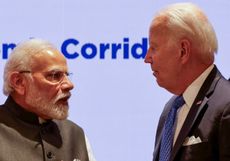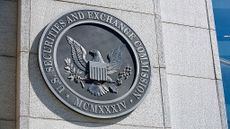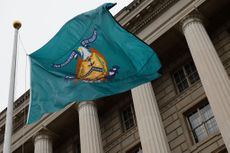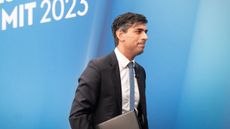TikTok replaces Facebook as political enemy No. 1
Lawmakers are renewing calls to get rid of the platform, accusing it of spreading propaganda
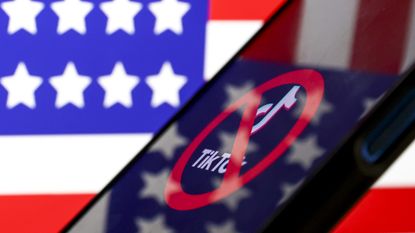

With its primary user base getting older and increased scrutiny from American lawmakers, it is clear that TikTok, initially known for spreading viral dance trends, has entered its political villain era. Calls for the platform to be banned have been mounting over the past few years and have taken on a renewed fervor as the platform tries to combat pushback from multiple angles.
TikTok recently came under fire for allegedly "promoting pro-Palestinian, anti-Israel content through its powerful feeds," The New York Times reported. The accusations stirred calls from Washington to ban the app, "arguing that Beijing may be influencing the content promoted through the platform’s algorithms." The accusations also led to a private meeting between more than a dozen Jewish influencers and celebrities and TikTok executives. The platform also faced backlash after Osama Bin Laden's "Letter to America" apparently went viral.
All of this controversy comes as TikTok increasingly becomes a news source, with the number of users who say they get it from the app nearly doubling since 2020, per a new poll by the Pew Research Center. TikTok still falls behind Facebook, which faced similar scrutiny for skewing towards far-right content, as the most popular social media app for news. That hasn't kept the younger, more left-leaning app from becoming the new center of the social media free speech debate.
Subscribe to The Week
Escape your echo chamber. Get the facts behind the news, plus analysis from multiple perspectives.

Sign up for The Week's Free Newsletters
From our morning news briefing to a weekly Good News Newsletter, get the best of The Week delivered directly to your inbox.
From our morning news briefing to a weekly Good News Newsletter, get the best of The Week delivered directly to your inbox.
TikTok is a serious threat, and the company could do more to protect users
For some critics, TikTok is not doing enough to quell the surge of inflammatory content on the platform. Actor Sacha Baron Cohen accused the platform of "creating the biggest antisemitic movement since the Nazis” by failing to use its tools to prevent a recent flood of antisemitic comments under videos posted by Jewish users, per the Times. During the private meeting, he criticized the platform for spreading violent images and disinformation. “Shame on you,” he said to Adam Presser, TikTok’s head of operations, before claiming that TikTok could “flip a switch” to combat antisemitism on its platform.
Between being accused of prioritizing pro-Palestine content and Obama Bin Laden's letter resurfacing, lawmakers from both sides of the political spectrum have seized the opportunity to reignite a push to ban the platform altogether. Rep. Josh Gottheimer (D-N.J.) accused TikTok of "pushing pro-terrorist propaganda to influence Americans" and called for it to be “banned or sold to an American company, in a post on X, formerly known as Twitter. Missouri Sen. Josh Hawley (R) similarly described the platform as “a geyser of terrorist propaganda — and the most effective surveillance tool for a foreign government ever invented,” in another X post.
Others criticized the platform's Chinese owners for purposefully allowing the spread of incendiary content. "Here in America, the application’s algorithm is exquisitely tuned to prioritize polarizing outrage and addictive, brain-numbing nonsense (at best) and dangerous propaganda (at worst)," Rep. Mike Gallagher (R-Wisc.) wrote In an op-ed for The Free Press. Gallagher said TikTok's parent company ByteDance and the Chinese Communist Party "have decided that China’s children get spinach, and America’s get digital fentanyl."
The moral outrage is opportunistic
Part of the increased attention on TikTok over other similar platforms comes down to it having "an ownership structure that has attracted negative attention," Phillip Bump noted in an analysis for The Washington Post. The fact that the app is a subsidiary of a company based in China "has made the company a target of U.S. government criticism and scrutiny from both sides of the aisle," Bump added. The backlash over the alleged amplifying of pro-Palestinian content, for instance, was identified by some critics as "downstream from Chinese national interests." TikTok's "ties to China also invite (at times opportunistic) overreaction," he observed, noting that another Post analysis found that Instagram "saw a similar divergence in interest between posts supportive of the Palestinian cause relative to Israel."
Garbage Day's Ryan Broderick called the platform "a political lightning rod," pointing out that the viral Osama Bin Laden story "was perfect for Democrats who want to explain away the very real generational divide happening on the left around support for Israel." It also works for "Republicans who are frightened that TikTok’s algorithm can turn red-blooded American men into Xi Jinping-worshipping catboys, or whatever," Broderick added. Intelligencer's John Herrman agreed that the videos of Gen Z reacting to the Bin Laden letter "slotted a little too neatly into wider conversations about how (particularly young) people are consuming news these days and about the political influence of foreign-owned TikTok."

Continue reading for free
We hope you're enjoying The Week's refreshingly open-minded journalism.
Subscribed to The Week? Register your account with the same email as your subscription.
Sign up to our 10 Things You Need to Know Today newsletter
A free daily digest of the biggest news stories of the day - and the best features from our website
Theara Coleman has worked as a staff writer at The Week since September 2022. She frequently writes about technology, education, literature and general news. She was previously a contributing writer and assistant editor at Honeysuckle Magazine, where she covered racial politics and cannabis industry news.
-
 Today's political cartoons - December 3, 2023
Today's political cartoons - December 3, 2023Cartoons Sunday's cartoons - life expectancy goes up, Kissinger goes down, and more
By The Week US Published
-
 10 things you need to know today: December 3, 2023
10 things you need to know today: December 3, 2023Daily Briefing Gaza residents flee as Israel continues bombardment, Trump tells supporters to 'guard the vote' in Democratic cities, and more
By Justin Klawans, The Week US Published
-
 5 X-plosive cartoons about Elon Musk
5 X-plosive cartoons about Elon MuskCartoons Artists take on his proposed clean-up of X, his views on advertisers, and more
By The Week US Published
-
 Worklessness: a national 'scandal'
Worklessness: a national 'scandal'Talking Point One in five working-age adults in Birmingham, Glasgow and Liverpool are neither in work nor seeking work
By The Week UK Published
-
 Alleged Sikh assassination plot rocks US-India relations
Alleged Sikh assassination plot rocks US-India relationsTalking Point By accusing an Indian government official of orchestrating an assassination attempt on a US citizen in New York, the Justice Department risks a diplomatic crisis between two superpower
By Rafi Schwartz, The Week US Published
-
 Dublin riots: a blow to Ireland’s reputation
Dublin riots: a blow to Ireland’s reputationTalking Point Unrest shines a spotlight on Ireland's experience of mass migration
By The Week UK Published
-
 Henry Kissinger dies aged 100: a complicated legacy?
Henry Kissinger dies aged 100: a complicated legacy?Talking Point Top US diplomat and Nobel Peace Prize winner remembered as both foreign policy genius and war criminal
By Harriet Marsden, The Week UK Last updated
-
 The Supreme Court could reign in the SEC — and federal agencies as a whole
The Supreme Court could reign in the SEC — and federal agencies as a wholeTalking Point The court is hearing arguments on the agency's ability to enforce financial penalties
By Justin Klawans, The Week US Published
-
 America doesn't have a wealth tax. The Supreme Court might kill it anyway.
America doesn't have a wealth tax. The Supreme Court might kill it anyway.Talking Point Justices are being asked to do something unusual: issue opinions about hypothetical legislation
By Joel Mathis, The Week US Published
-
 How a long-term truce in Gaza could have ripple effects across the Middle East
How a long-term truce in Gaza could have ripple effects across the Middle EastTalking Point Israel and Hamas have recently agreed to extend their peace for two more days
By Justin Klawans, The Week US Published
-
 Sunak's migrant deal with Braverman: a drift from 'proper' political process?
Sunak's migrant deal with Braverman: a drift from 'proper' political process?Talking Point PM allegedly promised tougher immigration measures in leadership deal with former home secretary
By Sorcha Bradley, The Week UK Published




